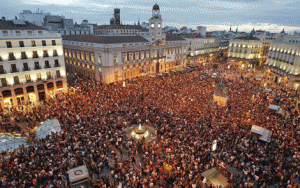Issue 1: Occupy Everything

Everybody Talks About the Weather | Asad Haider and Salar Mohandesi
It could very well be that the durability and radicalization of this movement will rely on its potential as a mediating element between the the various segments of the class, their particular interests, and their traditional forms of struggle. Achieving this means going beyond a spontaneous reflection of changes in our working lives. It has to start by understanding the system underlying them.
Who Threw the Can of Green Paint? The First Two Weeks of Occupy Philadelphia | Ben Webster
On the morning of October 14, one week into Occupy Philadelphia’s encampment beside City Hall, someone emptied the contents of a paint can on the building’s southwestern entrance. This incident suggests the ambiguity and contradiction in the political imagination of Occupy Philadelphia. What constitutes meaningful action – a spectacular act of vandalism, the peaceful occupation of public property, or direct action on the horizon more confrontational and radical? There has been no shortage of activity – daily marches strike out to the usual targets – but as of yet no dramatic confrontations like those of Occupy Wall Street have occurred.
From Egypt to Wall Street | Wendell Hassan Marsh
For many in the Arab world, the connection was not lost for a minute. They saw in the occupation of the Wisconsin State Capitol the same spirit that was present in Mohamed Bouazizi’s self-immolation: the refusal to accept the financial order’s demand to obliterate decades of progressive struggle and negotiation. As many set out today to occupy everything, let us take a moment to remember the real origins of this movement and allow it to guide our ongoing politics.
Insurrection, Oakland Style: A History | Matthew Edwards
This is an unfinished work – a snapshot of history as it occurred, experienced by me, reported on social media, or retold by trusted comrades. It will lack the finality of hindsight. Contained within is my account of the Oakland Insurrection, as it has unfolded over the past days and weeks. Both the insurrection and this essay are works of hope. I hope that we push forward on the streets of Oakland, the Bay Area, and everywhere else, to the limit of what is possible – beyond occupation and the proposed general strike to “total freedom” for us all.
The Italianization of Puerto Rico: A Reflection on Social Struggles Against University Policies in the World’s Oldest Colony | Andrea Righi
Dismantling a public education system in a country with strong background of political struggles requires a mitigated form of neoliberal strategy. Between 2009 and 2010, I observed this operation as a new professor at the University of Puerto Rico. In the spring of 2010, students opted for an indefinite strike. The one-month-long occupation of the Mayagüez campus left a permanent memory in those who participated in it.
Turn on the Heat: The Underground History of Occupation | Julie McIntyre
Though some recent media accounts depict rent parties as a novel practice of the alternative white twenty-somethings who gentrify black communities, they began as a dynamic and autonomous response to exploitation, and warrant careful study as a traditional practice of occupation. Although the concept was not widely addressed in mainstream U.S. media prior to the seizing of Zuccotti Park and various other public and private spaces in American cities, the act of occupying has a rich and complex history.
Occupy the Workplace: Organized Labor and the Occupations Movement | Samir Sonti
Only through following a long-term organizing approach can Occupy Wall Street begin to harness the anger and energy it has made visible and translate it in into a dynamic, class-conscious movement. And only the labor movement has the experience and organizational capacity to take on the challenge.
Deviations, Part 1: The Castoriadis-Pannekoek Exchange | Asad Haider and Salar Mohandesi
Spanning an entire generation, a linguistic divide, and a geographical shift, the epistolary encounter between Anton Pannekoek and Cornelius Castoriadis in many ways marks the internal transformation of the ultra-left. But the ultra-left, far from a historical relic, is making headlines again.
Letter 1: Pannekoek to Castoriadis | Anton Pannekoek
While you restrict the activity of [workers’ councils] to the organization of labor in factories after the taking of social power by the workers, we consider them as also being the organisms by means of which the workers will conquer this power. In the conquest of power we have no interest in a “revolutionary party” that will take the leadership of the proletarian revolution.
Letter 2: Castoriadis to Pannekoek | Cornelius Castoriadis
Where in contrast there is, in fact, a real difference of opinion between us, is on the question of knowing if, during this revolutionary period, these councils will be the sole organism which plays an effective role in conducting the revolution, and, to a lesser extent, what the role and task is of the revolutionary militants in the meantime. That is, the “question of the party.”
Letter 3: Pannekoek to Castoriadis | Anton Pannekoek
Naturally, I do not claim that the revolutionary actions of the working class will all unfold in an atmosphere of peaceful discussion. What I claim is that the result of the struggle, often violent, is not determined by accidental circumstances, but by what is alive in the thoughts of the workers, as the basis of a solid consciousness acquired by experience, study, or their discussions. If the personnel of a factory must decide whether or not to go on strike, the decision is not taken by smashing fists on the table, but normally by discussions.
 Viewpoint Magazine
Viewpoint Magazine